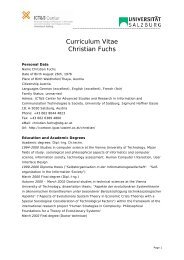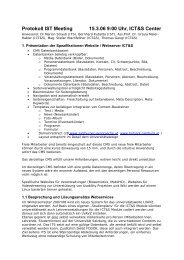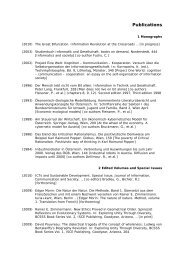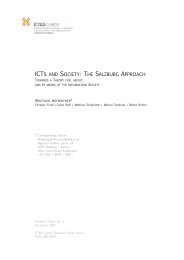Christian Fuchs: Social Networking Sites and the Surveillance Society8. Implications and ConclusionsIn this section, we will discuss some political conclusions of our study. The implicationsand conclusions are organized along the five research questions that were introducedin section 6.(1) What do students consider as the greatest opportunities of ISNS?(2) What do students consider as the greatest risks of ISNS?We asked the respondents what they think the greatest advantages and disadvantages,i.e. opportunities and risks, of social networking sites were with the help of two openquestions.Maintaining existing friendships, family contacts, etc. with the help of socialnetworking sites is the most important advantage that the students in our surveymention. 59.1% of them consider it as a major advantage. 29.8% say that establishingnew contacts is very important, 19.9% mention finding and renewing old contacts andfriendships as major advantage. Maintaining existing contacts seems to be moreimportant than establishing new contacts or renewing old contacts on socialnetworking sites.55.7% of the respondents say that political, economic, or personal surveillance as aresult of data abuse, data forwarding, or a lack of data protection is a main threat ofsocial networking sites. 23.1% say it is problematic that personal affairs that shouldbetter be kept private and should not be known by others tend to become public onsocial networking sites.The data of our survey show that 59.1% consider maintaining existing contacts and29.8% establishing new contacts as major advantage of social networking sites,whereas 55.7% say that surveillance as a result of data abuse, data forwarding, or alack of data protection is a major threat of such platforms. Although students are verywell aware of the surveillance threat, they are willing to take this risk because theyconsider communicative opportunities as very important. That they expose themselvesto this risk is caused by a lack of alternative platforms that have a strongly reducedsurveillance risk and operate on a non-profit and non-commercial basis.(3) How knowledgeable are students of the rise of a surveillance society?We asked questions about the judicial situation of surveillance in Austria and Europe,including questions about the increased surveillance options available to the police dueto the amendment of the Austrian Security Police Act and the introduction of theEuropean Data Retention Directive. With the help of these questions, we calculated asurveillance knowledge index. 81.8% of the students in our survey had no or only littleknowledge about surveillance, whereas 18.3% had a good or high degree ofknowledge about surveillance. The median of the surveillance knowledge index is 1(little knowledge of surveillance). Gender, class, income, and location stratify student’sknowledge about surveillance. Being female and having a white-collar father increasethe possibility of having low surveillance knowledge, being male, higher income, andliving or coming from a larger city increases the possibility of having a high degree of99
Christian Fuchs: Social Networking Sites and the Surveillance Societysurveillance knowledge.It is certainly desirable that young Austrians have good knowledge of the politicalsituation in Austria and Europe. In order to increase the degree of conscious knowledgeabout surveillance, we suggest that critical educators, critical scholars, socialmovements, consumer groups, data protection specialists/groups, consumer protectionspecialists/groups, critical citizens’ initiatives, unions, critical media, critical politicians,and political parties that are critical of surveillance present the topic of the surveillancesociety in the public, in educational courses, the media, and especially in addressingyoung people as a central problem of contemporary society that threatens democracyand human rights. Students in most societies are the most well informed and mostcritical citizens. If they only have a low degree of knowledge about surveillance, thenthis is an alarm signal that is an indication that there is little such knowledge in theoverall population, too, and that there is a lack of critical public discourse on the issue.Such public awareness initiatives might remain limited, if there are powerful institutionsand actors that have an interest in forestalling critical public debates on surveillancedue to economic or political interests. Nonetheless, to try to strengthen public debate isthe only way of struggling for improvements.(4) How critical are students of the rise of a surveillance society?We combined the answers to five scaled questions to an overall surveillance critiqueindex that can take on values between zero and twenty-five (0: no criticalconsciousness on surveillance, 25: very critical of surveillance). The statistical averageof this index is 17.3. 67.4% of the respondents are critical or rather critical ofsurveillance. Critique of surveillance is stratified by gender, field of study, number ofsemesters studied, income, and usage frequency of ISNS. Being female, studying naturalsciences, and high usage of ISNS increase the probability to be uncritical ofsurveillance, whereas being male, studying social sciences, having higher income, andbeing a graduate or doctoral student increases the likelihood that students are critical ofsurveillance. 58.9% agree or agree strongly that state surveillance has increased after9/11. 58.1% agree or strongly agree that you have to be afraid of surveillance even ifyou have nothing illegal to hide. But critique towards surveillance seems to be diffuse.Most know that surveillance is problematic, can threaten privacy, undercut democracy,and pave the way towards a totalitarian society, but there is little knowledge about theactual juridical situation in Austria and Europe.There is a general critical attitude of students towards surveillance combined with littleknowledge about surveillance. If there is a critical basic attitude, then it is likely thatcitizens will act politically once they feel alarmed by public discussions. Thereforegiven such a condition, political discourse is easier and promises to be more successfulthan in situations where there is little critical consciousness on a certain topic.Therefore it is quite likely that a certain degree of students will join citizens’ initiativesand act politically if they gain more knowledge about actual surveillance. Ourrecommendation is therefore that critical educators, critical scholars, social movements,consumer groups, data protection specialists/groups, consumer protectionspecialists/groups, critical citizens’ initiatives, unions, critical media, critical politicians,and political parties that are critical of surveillance present the topic of the surveillancesociety on a very concrete level that shows how citizens are immediately affected by100









